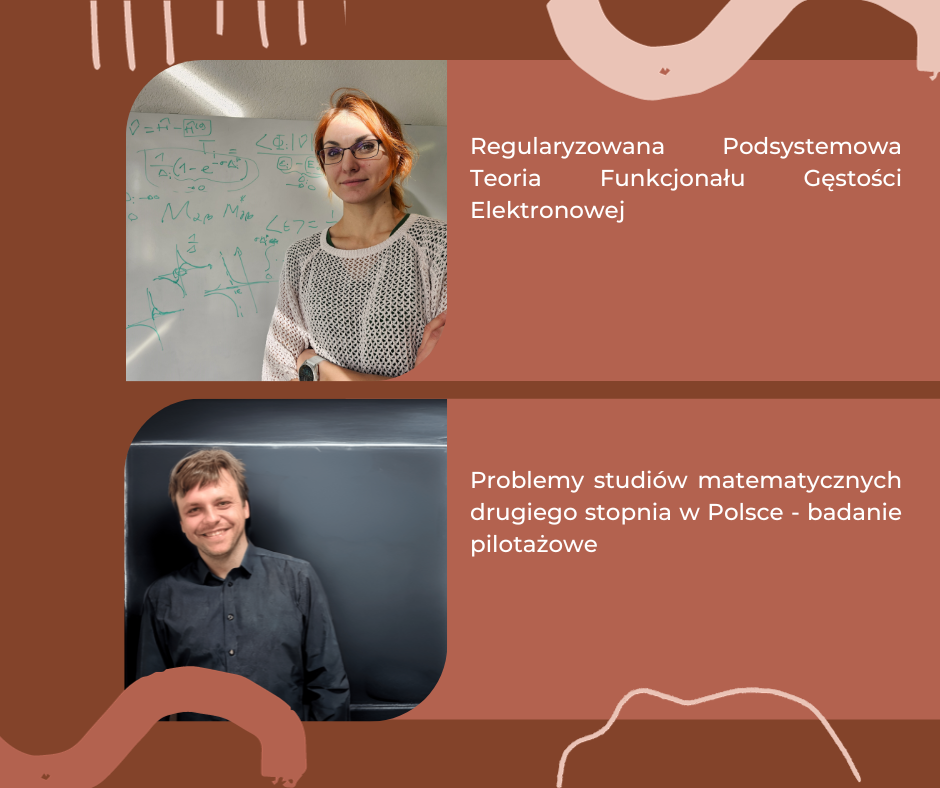We know the results of the sixth ranking list of the Miniatura 7 competition of the National Science Center. Scientists from our Faculty have achieved successes again.
The grants awarded concern individual scientific activities, preliminary or pilot research, research internships or consultation trips. From the Faculty of Technical Physics, Computer Science and Applied Mathematics of the Lodz University of Technology, they were received by Dr Agnieszka Krzemińska-Kowalska from the Institute of Physics and Dr Filip Turoboś from the Institute of Mathematics.
- Dr Agnieszka Krzemińska-Kowalska received nearly PLN 50,000 for a project Regularised Subsystem Density Functional Theory (rsDFT)
The proposed research aims to develop an innovative, enhanced and expedited computational methodology tailored for large-scale computations within the framework of Density Functional Theory. This project is set to unfold as part of a research internship at the University of Geneva (UNIGE) in Switzerland, under the guidance of Professor Tomasz Wesołowski.
At the core of our research methodology lies the strategic utilization of embedding theory to alleviate computational costs. Standard methods in quantum chemistry grapple with the curse-of-dimension problem, associated with unfavorable scaling concerning the system size. Ideally, achieving linear scaling of computational costs proportional to the number of atoms within a chemical system is desirable. This stands in contrast to methods like full configuration interaction, which is potentially exact but exhibits factorial scaling with the system size. One approach to mitigate this scaling issue involves dividing the entire system into fragments or subsystems and addressing each sub-system independently. This concept is formalized in embedding theory, such as subsystem Density Functional Theory (sDFT), employing a layered technique where the system is divided into fragments characterized at a more sophisticated and expensive level of theory, while its proximate environment is treated at a lower and more cost-effective level of theory.
In sDFT, the overall electron density undergoes division, and the system's total energy is subsequently minimized with respect to selected electron densities, yielding an optimized electron density for the entire system. Serving as a compelling alternative to conventional methods like the Kohn-Sham (KS) method, sDFT proves more cost-effective than KS-DFT through judicious density partitioning while maintaining accuracy in the realm of exact energy functionals. Additionally, the embedding potential naturally emerges within the framework of sDFT, outlining the influence of all other subsystems on the specific subsystem under scrutiny for electronic structure determination. This embedding potential depends exclusively on the electron density of other subsystems, remaining independent of their wave functions or other associated quantities, making it applicable in the orbital-free formulation of DFT. Our goal is to enhance sDFT theory, addressing issues with the proper approximation of non-additive kinetic potential and the challenge of nonunique solutions under significant overlap of electron densities.
Motivated by the aspiration to develop an improved rsDFT, our objective is to create a flexible and computationally efficient tool, thereby providing researchers with the means to address complex problems in various scientific and engineering domains.
-
Dr Filip Turoboś received nearly PLN 5,000 for a project Problems of master's mathematics studies in Poland - pilot study.
During his employment at the Institute of Mathematics of the Lodz University of Technology, Dr. Turoboś noticed that giving lectures gave him a lot of joy. A large part of bachelor's degree students do not decide to continue their studies, which is not a phenomenon specific only to mathematics programs at the Lodz University of Technology, but rather a nationwide phenomenon, which can be observed by comparing the lists of candidates for bachelor- and master studies. The main goal of the scientific activity that is the subject of the obtained grant will be to analyze factors that are not documented in the POL-on system, but may have a significant impact on the decisions of mathematics students regarding their further professional and academic fate.
Ultimately, the pilot study will include questions to assess both the student's professional, financial and family situation (in terms of factors hindering or preventing further education), as well as impressions from bachelor studies in terms of competences obtained during studies.
